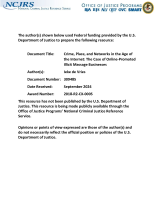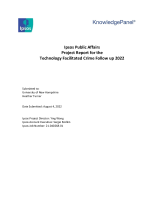Cyber crime
Crime, Place, and Networks in the Age of the Internet: The Case of Online-Promoted Illicit Massage Businesses
Adversarial Autoencoder Data Synthesis for Enhancing Machine Learning-Based Phishing Detection Algorithms
Technology Facilitated Crime Follow-up 2022
Violence brokers and super-spreaders: how organised crime transformed the structure of Chicago violence during Prohibition
When Patriot Becomes Hate-triot: The Relationship Between American Identity and the Production of Cyberhate
Rep2Vec: Repository Embedding via Heterogeneous Graph Adversarial Contrastive Learning
In-person and cyber dating abuse: A longitudinal investigation
Investigating Wearable Fitness Applications: Data Privacy and Digital Forensics Analysis on Android
A Training Tool for Internet Crimes Against Children Cases
An undergraduate research in computer forensics
An Overview of Anonymity Technology Usage
Profiles of Youth In-Person and Online Sexual Harassment Victimization
Data-driven system identification of the social network dynamics in online postings of an extremist group
The ties that bribe: Corruption's embeddedness in Chicago organized crime
Continuation and Expansion of DCCI Stegextraction Project
Continuation and Expansion of DCCI Stegextraction Project
Continuation and Expansion of DCCI Stegextraction Project
Continuation and Expansion of DCCI Stegextraction Project
Exogenous Shocks, the Criminal Elite, and Increasing Gender Inequality in Chicago Organized Crime
From Dot Coms to Pipe Bombs: Online Radicalization and Mobilization to Violence
National Computer Security Survey (Bureau of Justice Statistics)
The goal of NCSS is to produce reliable national and industry-level estimates of the prevalence of computer security incidents (such as denial of service attacks, fraud, or theft of information) against businesses and the resulting losses incurred by businesses. The first national survey of thousands of businesses is being conducted in 2006. It is cosponsored by the Bureau of Justice Statistics and the National Cyber...
Expanding Research to Examine the Impacts of Forensic Science on the Criminal Justice System
In 2004, the National Institute of Justice created the social science research on forensic sciences (SSRFS) research program to explore the impact of forensic sciences on the criminal justice system and the administration of justice. Much of the early research from the SSRFS program focused on DNA processing and the use of DNA in investigations and prosecutions.
See the YouTube Terms of Service and Google Privacy Policy




